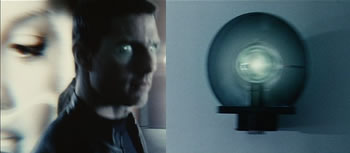
IRIS images may soon be able to do more than just verify your identity - they may confirm your race and gender too.
The iris controls the size of the pupil and gives a person's eyes their colour. It grows into a complex and unique pattern as a fetus develops and remains the same throughout a person's life. This fact has been successfully exploited in iris-based biometric systems, which work on the principle that each iris is completely different to any other.
But that is not strictly true, as Kevin Bowyer at the University of Notre Dame in South Bend, Indiana and his colleagues have found. They have developed a system that can pick out similarities between irises, instead of differences. Initial tests show it can distinguish between people of two different racial backgrounds and shows promise in determining gender.
"You might assume that there is no similarity in iris texture," says Bowyer, "but you would be wrong."
In a typical iris scan, a camera snaps an image of a person's eye while it is bathed in near-infrared light. Software identifies the iris portion of the eye, and then analyses 1024 sample regions, looking for patterns in the way the delicate filaments of tissue, known as the stroma, reflect light. This unique information is then used to generate a code of binary numbers.
Bowyer's team's method adds a layer of complexity. For each of the sample regions, their software identifies features such as lines or spots in the stroma, and saves that information. It also records how brightness varies across each region.
This richer set of attributes allowed the researchers to train an algorithm to look for common features among irises of known ethnicity and gender. When they turned the system on a database of unknown irises of 1200 people, it predicted whether a person was Chinese or Caucasian with over 90 per cent accuracy, and correctly identified gender 62 per cent of the time. The team will present the research next month at the IEEE International Conference on Technologies for Homeland Security in Waltham, Massachusetts.
The reason for the low success rate in predicting gender, Bowyer says, is because the team have not yet fully worked out which textural features of the iris correspond to gender. He says that the fact that the results are better than chance means it should be possible to improve the system's ability to determine gender. The team has also not yet tested the system on people with other or more complex ethnic backgrounds.
Aside from making it difficult for people to fabricate a false identity in which they have a different gender or race, the method could speed up searches within large iris databases by reducing the data subset to be searched. It would also be possible to count the number of people belonging to different ethnic backgrounds coming into a country without recording their identity.
"It is interesting work that does fly a bit in the face of conventional thinking," says Vijayakumar Bhagavatula of Carnegie Mellon University in Pittsburgh, Pennsylvania. Iris patterns are generally considered to be highly random; even a person's left and right iris are different. Still, he says, "in the absence of an established biological connection between iris pattern and gender or ethnicity, there is no way to know if the features being used by Bowyer are the 'best' ones to use. There may be other features that give better prediction rates."
The iris code
Today, most commercial iris-recognition systems use an algorithm developed by John Daugman of the University of Cambridge and patented worldwide in 1992.
Daugman's insight lay in computerising a process to mathematically analyse the random patterns visible within the iris image to create a binary code called an iris code. This code is so individual to a person - even identical twins have different iris codes - that only 70 per cent of it needs to match for an iris comparison to be considered successful. The chance of a greater than 70 per cent match between two irises is less than 1 in 10 billion.
Story Here
Really neat stuff!



